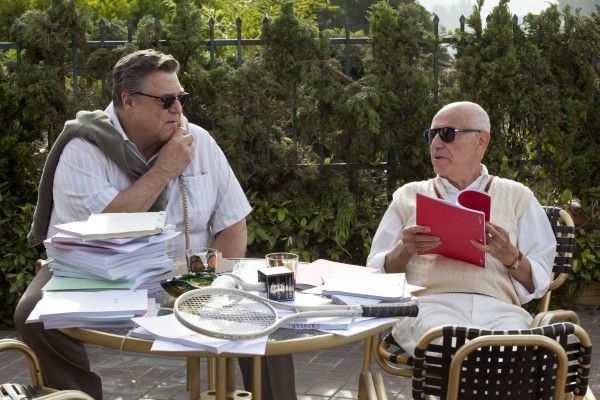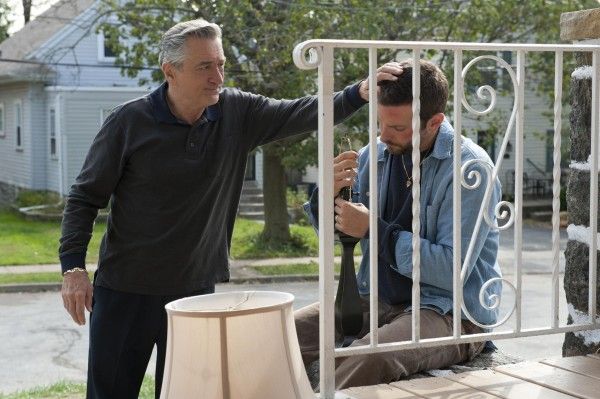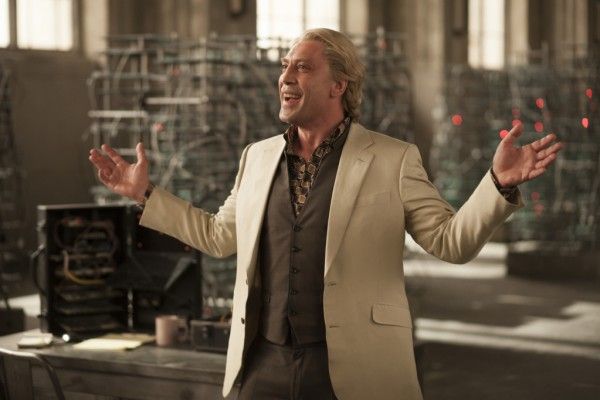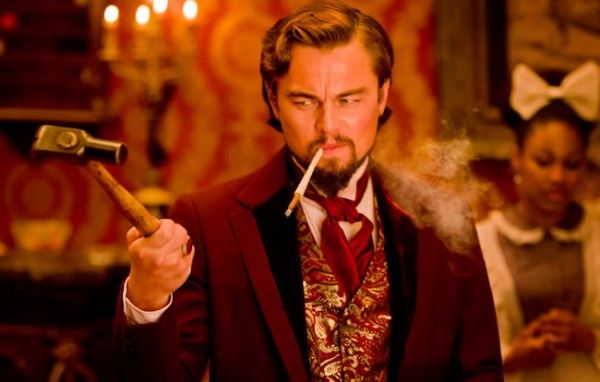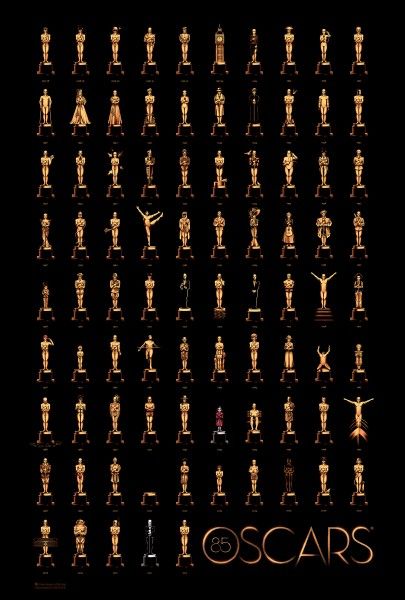We’re only a short week away from the 85th Academy Awards, and with the close of Oscar season approaching, we’d thought this would be a nice opportunity to take a look back at how some of the races have played out, chronicling the ebbs and flows of the past 12 months or so that got us to where we are today. We’re kicking things off with one of the more open categories: Best Supporting Actor.
One important thing to keep in mind when looking at the Oscars is that the race is incredibly fluid. A film could be the clear frontrunner in a category one week, then might stumble to second or even third place in the ensuing weeks. With this series of articles, we’ll be looking at exactly how much each race has changed, starting with Best Supporting Actor. Hit the jump to read on.
Every year, the Supporting Actor and Supporting Actress categories are where prognosticators look for the surprises. Though Best Picture and Best Director are usually down to two candidates or so by Oscar night, there’s always that feeling that a completely left-field choice could take home one of the supporting trophies. As such, the Best Supporting Actor race was quite wide open leading up to the nominations, and there’s still a lack of consensus surrounding which actor might finally take home the gold.
Though the majority of the contenders arrived in the fall, a couple of viable candidates surfaced last summer by way of Dwight Henry for his excellent work in the Sundance hit Beasts of the Southern Wild and, somewhat surprisingly, Matthew McConaughey for his turn as a male stripper in Steven Soderbergh’s sleeper hit Magic Mike. Henry held his own opposite his 6-year-old co-star Quvenzhane Wallis (who is nominated for Best Actress), and was singled out for a striking turn in one of the most emotional films of the year. McConaughey was sublime in Magic Mike, and many wondered if the Academy might take notice to mark the unofficial “Year of McConaughey.” While the two actors remained in the running as Dark Horse candidates, the possibility of getting in dwindled as the fall releases spurred a large batch of contenders.
When Argo was declared the early frontrunner for Best Picture at the Telluride Film Festival, most surmised that the film’s best shot at an acting Oscar win would be in the Best Supporting Actor category; but for whom? John Goodman, Bryan Cranston, and Alan Arkin all did great work in the film, and it was tough to discern which one or two had the best shot at Osacr. As the weeks went on, however, it soon became clear that Arkin had the edge not only for his touching and humorous performance, but also because he’s an Oscar veteran with three nominations and one win under his belt. The Academy is a big fan of Mr. Arkin, you see, and history matters.
Another strong supporting performance from the fall came from Philip Seymour Hoffman in director Paul Thomas Anderson’s The Master. Though the film turned out to be fairly polarizing among critics, the entire cast received unanimous praise for their incredible work onscreen. A previous Oscar winner in the category, Hoffman was singled out for his calculating and tense performance as Lancaster Dodd and the actor remained a staple of the Best Supporting Actor contender list throughout the ensuing months.
Nipping at Argo’s Best Picture heels was another festival favorite, Silver Linings Playbook, and though his screentime isn’t lengthy and his character isn’t flashy, Robert De Niro gained a considerable amount of praise for his work in the film. Whether critics were simply happy to see the Raging Bull star in a good movie for once or if his performance really is that great is a topic of debate, but as The Weinstein Company kicked their awards campaign for SLP into high gear (they're pretty great at this Oscar-marketing thing), De Niro’s performance remained a primary component of their hunt for Oscar glory.
Heading into November, two more major contenders surfaced. Steven Spielberg’s Lincoln struck a chord with audiences and critics alike, and while the praise was deservedly heaped on Daniel Day-Lewis for his incredible portrayal of the president, Tommy Lee Jones also earned high marks for his powerful supporting work. Jones previously won this award for The Fugitive, and while he essentially plays a Tommy Lee Jones version of Thaddeus Stevens, it’s nevertheless powerful stuff.
The performance-driven drama solidified itself as a major awards contender upon release, with Day-Lewis and Jones leading the pack in the hunt for acting nods. James Spader was also singled out for his stellar work in the film, but his limited screentime coupled with Jones and Day-Lewis commanding most of the attention meant that a serious bid for a Best Supporting Actor nomination on Spader's behalf was likely out of reach.
The other major contender from November came by way of a James Bond film. While audiences were eager to sit back and take in the fun of Skyfall, moviegoers were pleasantly surprised to see that director Sam Mendes crafted not only a thrilling entry in the franchise, but quite possibly one of the best Bond films of all time, complete with a new classic Bond villain brought to life by Javier Bardem. The previous Best Supporting Actor winner (I’m sensing a theme here…) was unforgettable as the flamboyant and nefarious Silva, and he quickly became a serious contender in the hunt for Oscar.
As we headed into December, all eyes were on Les Miserables and Django Unchained. With the former being hailed as an Oscar juggernaut before anyone had even seen the film, Russell Crowe was already on the shortlist for Best Supporting Actor. When the film finally did screen and was met with a rather mixed response, Crowe became less of a sure thing and more of an outside possibility. Reactions were split on Crowe’s performance as Javert, with half saying his singing was terrible and the other half saying he was perfectly in tune with the character. Whatever the case, Crowe never made much of a splash and quickly found himself a long shot for a nomination. The dark horse contender from the film, though, was Eddie Redmayne who found himself singled out as a possible surprise nominee, though the lack of passion for the film overall kept him from ever rising to the front of the pack.
Then came Quentin Tarantino’s Django Unchained. The prospect alone of Leonardo DiCaprio taking on a villainous role in a Tarantino movie was prime for Oscar glory, but when the film finally opened, audiences and critics found that the pic was an embarrassment of riches as far as the performances were concerned. DiCaprio was stupendous as expected, but Samuel L. Jackson was unforgettably nasty as Steven and Christoph Waltz absolutely shined as Django’s companion. Prognosticators were now faced with a conundrum: which supporting actor from Django gets a nomination, or do they all split the votes and result in a Django shutout? It was essentially a crapshoot, and a consensus didn’t really circle around one single candidate in the weeks leading up to the Oscar nominations.
When the Screen Actors Guild Awards nominations were announced, it seemed as though three of the spots had been firmed up with Tommy Lee Jones, Alan Arkin, and Robert De Niro considered near-locks for Oscar nominations. SAG filled out the rest of the category with Philip Seymour Hoffman and Javier Bardem. Support for The Master was waning so Hoffman’s spot seemed to be in jeopardy, though he was a better bet than Bardem for Oscar. In the days leading up to the Oscar nominations, some were predicting a snub for De Niro or Hoffman in favor of a surprise like Matthew McConaughey or Dwight Henry. There was also the Django question, with many playing it safe by going with DiCaprio for the nomination over Waltz and Jackson and some leaving Django off the list altogether.
The Oscar nominations have been announced and we’re now left with five previous Academy Award winners who will be gunning for Oscar glory: Tommy Lee Jones, Alan Arkin, Robert De Niro, Christoph Waltz, and Philip Seymour Hoffman. Any one of these actors has a serious shot at winning on Oscar night, and I expect we’ll see even more ebbs and flows as we move closer to the ceremony.
Keep checking back here on Collider in the coming days as we take a look back at the Oscar races in quite a few other categories.

